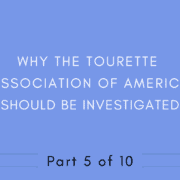Will Antivirals and Nasal B12 Help My Daughter’s Tics?
This question was received by ACN Latitudes and replied to by Dr. Albert Robbins:
Question
My 10-year-old daughter has Tourette’s, ADHD, anxiety and OCD. I was doing some reading and wonder if anyone has tried using an antiviral medication on a child such as mine? I know there’s some research being done on kids with PANDAS and strep infections, and possibly antivirals for autism. What about the role viruses play in kids with tics? My daughter’s symptoms seem to get tremendously better in May when the weather warms up and escalate in September when all of the kids at school begin sharing germs. I blamed it on the stress of school but now I am not so sure.
Also, what about nasal B12? Has this been tried? Any insight you could give would be great.
Dr. Albert Robbins
I note that your daughter’s symptoms of ADHD, OCD, anxiety, and Tourette syndrome change seasonally. Given this, your child may be more susceptible to infections during the colder weather due to hidden allergies and sensitivities. Without knowing where you live, it’s possible she could be allergic to seasonal inhalants, including fall and winter molds, spring and fall pollens, and multiple other environmental agents including modern day common chemical exposures at home or school. Hidden allergies could be a part of the problem. A proper allergy and environmental evaluation is appropriate.
I do not know of any studies related to the use of antivirals for correction of these symptoms. Blood testing can be done to determine if a hidden viral infection exists. Check with your pediatrician for this. Infections can certainly have neurological consequences. And of course stress can be a factor.
Nasal B12 would be considered experimental for tics, although probably safe to try. I have used nasal B12 for some chemically sensitive patients and it appears to help reduce some people’s reactions to chemical odors. I often prescribe B12 treatment in the form of sublinguals, oral supplements, and injection for select patients with tic disorders when their history indicates a need for this.
The important thing in evaluating and treating children is “first do no harm.” In this regard, it’s important to use treatments that address existing imbalances and patient-specific conditions, and these vary from one individual to the next. Secondly, you want to search for, find, and eliminate the causes and aggravating environmental and other factors triggering a health problem . . . then one needs less medications.









